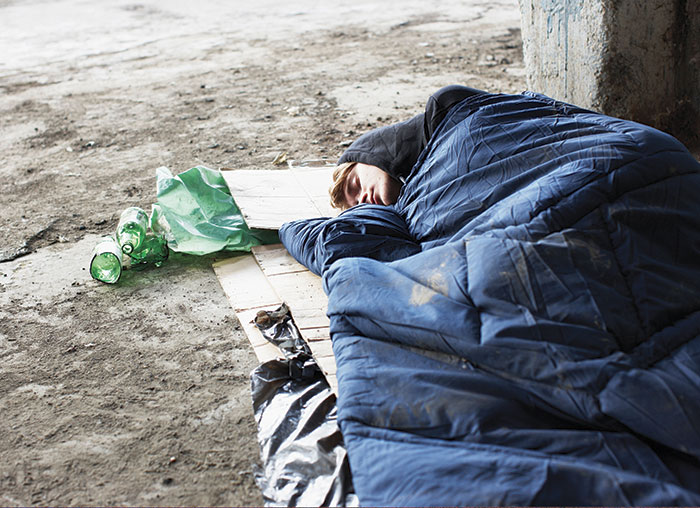
Photo: Alamy
Churches in Bristol are preparing to throw their doors open to homeless people. From early January, they will open each night on a rota basis so that fewer people spend the coldest two months of the year sleeping rough. Outside London, Bristol has the largest number of rough sleepers in England. On a typical night, around 100 people have nowhere to sleep, the council estimates.
Paul Smith, cabinet member for housing, recognises these problems result partly from the city’s vibrant economy. House prices are rising, along with private rents, and there is not enough social housing. “We’re beginning to see the same housing divide as London,” he says.
Homelessness has been rising steadily in England since 2011. In June, 73,120 households were in temporary accommodation – up 9% on a year earlier – nearly three quarters of them in London; the number in bed and breakfast rose by 16% to 6,520 in the year to June.
Last autumn’s rough sleeper count, based on snapshot surveys on single nights and local authority estimates, showed a 30% increase on the previous year, a total of 3,569 people in England.
Alice Ashworth, senior policy officer at homelessness charity Crisis, says the rough sleeper figure is partly down to councils turning away or providing minimal assistance to “non-priority” cases – people who local authorities do not have to provide with temporary or longer-term accommodation. By law, councils have to do this only for households in priority need, which includes pregnant women, people with dependent children or those who are vulnerable because of health conditions or young or old age, for example; these people must also not be deemed to have made themselves homeless intentionally.
“A lot of people end up living on the streets or in dangerous conditions,” Ashworth says.
Forthcoming legislation is likely to require councils in England to do more to prevent homelessness. The Homelessness Reduction Bill, proposed by backbench Conservative MP Bob Blackman and supported by the government, received a second reading in late October.
Under the bill’s provisions to reduce homelessness, local authorities will have to help anyone who is at risk of becoming homeless within the next 56 days, instead of 28 days as at present. All applicants will be assessed and given a personal housing plan, which will include their current circumstances, desired outcome and steps to be taken by both themselves and the authority.
Having initially expressed reservations, the Local Government Association is backing the bill – as long as its provisions are funded properly. “The last thing any council leader wants is people sleeping rough on their patch,” says LGA chair Gary Porter.
A report in August by the communities and local government committee identified three main reasons for the increase in homelessness. In addition to a shortage of social or affordable housing, MPs blamed benefit cuts and rising private sector rents.
About one third of households accepted as homeless by English councils have been evicted by private landlords. In some cases, their housing benefit, fixed in line with local housing allowance (LHA) rates, is below private rent levels.
Laurence Coaker, head of housing needs in Brent, says LHA caps are a “real killer” for families. “The private rented sector has contracted for households on benefits,” he says. “Landlords know they can charge more rent to a household that’s working.”
From 7 November, the benefit cap for families was cut from £26,000 to £20,000 (£23,000 in London). The Chartered Institute of Housing (CIH) warned that this would affect 116,000 families and be felt across the country, not just London.
About 300 households approach Brent Council each month because they are or could become homeless. Around one fifth are in priority need; at the end of March, the council had 2,956 households in temporary accommodation.
London councils are increasingly housing people outside the capital. Earlier this year, Redbridge was found to be using an old army barracks in Canterbury, 60 miles away.
Barbara Brownlee, director of housing and regeneration at Westminster City Council, says councils across the country are doing more to prevent homelessness, including family mediation. “We have services in children’s centres dealing with problems before they become crises,” she says.
The number of households accepted as homeless and in priority need by Westminster fell from 813 in 2012-13 to 511 in 2015-16. However, the number in temporary accommodation is much the same at about 2,400.
Westminster has more rough sleepers than anywhere else in the UK – 265 at last autumn’s count. About one third are entitled to statutory support, but only about 4% have a connection with the borough.
“We pick up and serve an enormous population from the rest of the UK and the rest of the world,” says Brownlee.
The government is promising councils extra money to fund the bill but has not given a figure.
Including council programmes, about £500m will be spent on preventing homelessness during the spending review period to 2019-20, the government estimates.
If the bill becomes law, local authorities in England will be in a similar position to those in Wales, where councils have had to help households who are at risk of being homeless in the next 56 days since 2015. Of the 7,128 households that approached Welsh councils in 2015-16, two thirds were prevented from becoming homeless for at least six months.
Councils were given £8.6m in transitional funding by the Welsh government over two years to cover the extra duty. Matt Kennedy, policy manager at the CIH in Wales, says the figures suggest fewer households are reaching crisis point, but points out that many fall below the radar of local authorities.
Crisis notes that many people – the so-called “hidden homeless” – may not come to the attention of councils because they stay with friends or relatives.
Ashworth believes the bill should reduce gatekeeping by councils. “We understand they are very stretched, but often a lack of resources is used as a justification for not providing help.”
Councillors such as Paul Smith disagree, saying that Bristol provides far more support than is required by law. The bill, he says, will not tackle the policies that lead to homelessness. “If the government stopped creating homelessness, we wouldn’t need this sort of legislation,” he adds.
Counting the cost of homelessness
Could the government save money by giving more assistance to people who are homeless? That is the conclusion of new academic research, commissioned by Crisis, which suggests that costs to the Exchequer would fall significantly if single homeless people were found somewhere to live.
Nicholas Pleace from York University and Dennis Culhane from Pennsylvania University in the United States surveyed 86 people in the UK who had been homeless for at least 90 days and assessed what had been spent on them in terms of public services over that period.
This included homelessness services, the NHS, drug and alcohol services, and any contact with the criminal justice system. That figure was then compared with what might have been spent on the individuals were living in secure accommodation, possibly with a job.
In two thirds of cases, the people would have been less ‘costly’ to the public purse if they had not been homeless. Overall, the academics estimated preventing homelessness for one year would result in a reduction in public expenditure of £9,266 per person.
A government study in 2012 suggested there are at least 40,000 single homeless people in the UK. Using the estimated saving per person, this could mean that public spending fell by £370m annually.
“When homelessness becomes recurrent and sustained, it become more expensive,” says Pleace. “If you can’t exit homelessness because you can’t get the support, you can get stuck into [requiring] homeless services that have a cost attached to them.



















